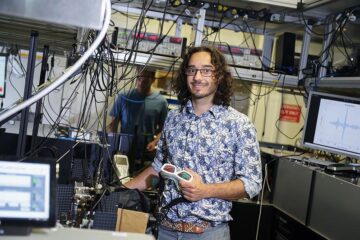CERN hosts conference on the Role of Science in the Information Society

On December 8-9, CERN will host the Role of Science in the Information Society (RSIS) conference, together with UNESCO, the International Council for Science, and the Third World Academy of Sciences. A Summit Event to the first phase of the World Summit on the Information Society (Geneva, December 10-12), RSIS is a grassroots initiative to bring science into the picture of the Summit. Press briefings at RSIS (see attached schedule) will enable journalists to delve deeper into the intersection of science, communication, and society.
Today’s scientists collaborate zealously, finding innovative ways to send information around the world at ever-greater speeds. While the scientific community supplies the driving force and technical know-how behind many cutting-edge information and communication technologies (ICTs), however, scientists have played little part in determining how those technologies can best be used.
„In terms of communication technologies, scientists are years ahead of other sectors of society,“ says Hans Hoffmann, Director of Computing and Technology Transfer at CERN. „So we’re in a good position to see how these technologies can be applied to other kinds of problems in the near future.“
Web inventor Tim Berners-Lee, Indonesian ICT activist Onno Purbo, and Romanian President Ion Iliescu will speak at the conference, along with many other distinguished scientists, policy makers, and members of civil society. „Knowledge is a key catalyst for development, especially when combined with the enormous potential of information and communications technologies,“ says WSIS Preparatory Committee President Adama Samassekou, who will speak at RSIS. „Through the innovative use of these technologies, we have the ability to share traditional knowledge as well as scientific discovery among the world’s peoples as never before, and the opportunity to expand our collective knowledge and improve mutual understanding.“
„Oracle is pleased to be associated with CERN’s Role of Science in the Information Society conference as our technology is a critical contributor to the information society and to CERN’s scientific research,“ says RSIS speaker Juan Rada, a senior vice president of Oracle Corporation.
During the first half-day of the conference, plenary speakers will give their perspectives on the past, present, and future of science, ICTs, and society. The following morning, attendees will divide into parallel sessions where they will explore one of five areas in more depth: enabling technologies, economic development, health, environment, and education. The plenaries will reconvene that afternoon, when participants will hear the results of the parallel sessions, a visionary panel, and closing remarks.
Some of the speakers will answer questions about their talks at one of three informal press briefings – a schedule is attached. Press registration is available at www.cern.ch/rsis under „participation.“
In parallel with the conference, CERN will hold a Science and Information Society forum at the ICT for Development platform in Geneva’s Palexpo centre during the World Summit. The forum will serve as a venue for scientific organizations to exhibit their ICT-related initiatives, and will also display the first Web server and information about CERN and RSIS. The platform will be open to the public from December 9-13.
A live webcast of the RSIS conference will show during the conference at http://webcast.cern.ch/live.php.
Media Contact
Alle Nachrichten aus der Kategorie: Veranstaltungsnachrichten
Neueste Beiträge

Neue universelle lichtbasierte Technik zur Kontrolle der Talpolarisation
Ein internationales Forscherteam berichtet in Nature über eine neue Methode, mit der zum ersten Mal die Talpolarisation in zentrosymmetrischen Bulk-Materialien auf eine nicht materialspezifische Weise erreicht wird. Diese „universelle Technik“…

Tumorzellen hebeln das Immunsystem früh aus
Neu entdeckter Mechanismus könnte Krebs-Immuntherapien deutlich verbessern. Tumore verhindern aktiv, dass sich Immunantworten durch sogenannte zytotoxische T-Zellen bilden, die den Krebs bekämpfen könnten. Wie das genau geschieht, beschreiben jetzt erstmals…

Immunzellen in den Startlöchern: „Allzeit bereit“ ist harte Arbeit
Wenn Krankheitserreger in den Körper eindringen, muss das Immunsystem sofort reagieren und eine Infektion verhindern oder eindämmen. Doch wie halten sich unsere Abwehrzellen bereit, wenn kein Angreifer in Sicht ist?…





















